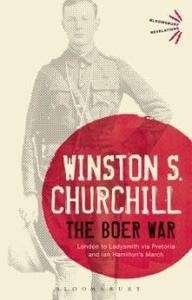The Boer War

Editorial Bloomsbury Academic
Colección Bloomsbury Revelations, Número 0
Fecha de edición octubre 2013
Idioma inglés
EAN 9781472520821
464 páginas
Libro
encuadernado en tapa blanda
Resumen del libro
The first shots of the Boer War were fired at Kraaipan on 12 October 1899. Winston Churchill, though he had left his Regiment, the 4th Hussars, in the previous March, was eager as ever to be within the sound of guns and wasted no time in getting himself accredited to the Morning Post as war correspondent. He sailed from Southampton aboard the Dunottar Castle on 14 October and reached Cape Town on the 31st. For the next eight months he filed his copy regularly for the Morning Post and it is these despatches which were later reprinted in book form as London to Ladysmith via Pretoria and Ian Hamilton's March. As both are comparatively short and as the one follows on from the other, they have since been published together under the title The Boer War.
In both books Churchill adopts the personal approach and recounts his own experiences set against the background of the War rather than attempting to give a picture of the conflict as a whole. As he says himself, 'Sometimes it happens that these letters are devoted to describing small incidents, and often personal experience, in a degree of detail which, if the rest of the campaign were equally narrated, would expand the account to limits far beyond the industry of the writer or the patience of the reader.' What emerges is a vivid and dramatic picture of the conditions under which the War was fought and of the problems which confronted the long untried British Army when faced with the dogged and determined resistance of the Boers.
Biografía del autor
Winston Leonard Spencer Churchill (Blenheim Castle, Oxfordshire, 1874-Londres, 1965), proveniente de una familia aristocrática victoriana, se graduó en el Royal Military College. Tras haber servido en la India, presenció la guerra anglobóer como corresponsal de guerra del periódico Morning Post. En 1900 fue elegido diputado por el Partido Conservador, que abandonó en 1904 para unirse al Partido Liberal. El gran salto en su carrera política se produce en 1940, cuando es elegido primer ministro en sustitución de Neville Chamberlain. Después de perder las elecciones en 1945 contra los laboristas, recuperó la jefatura del Gobierno durante el periodo comprendido entre 1951-1955. Tras dimitir ese año, se dedicó a la pintura y la literatura, campo en el que destacó con obras como Paso a paso: del crepúsculo de la paz al resplandor de la victoria, Sangre, sudor y lágrimas, Los secretos de la guerra, Pensamientos y aventuras y Savrola. En 1953 se le otorgó el premio Nobel de Literatura.








